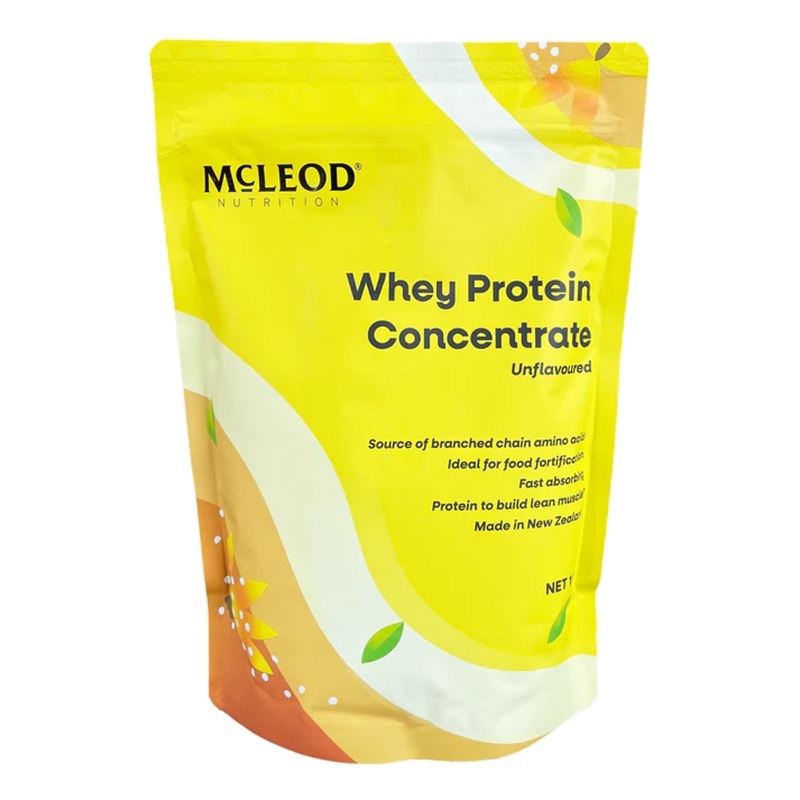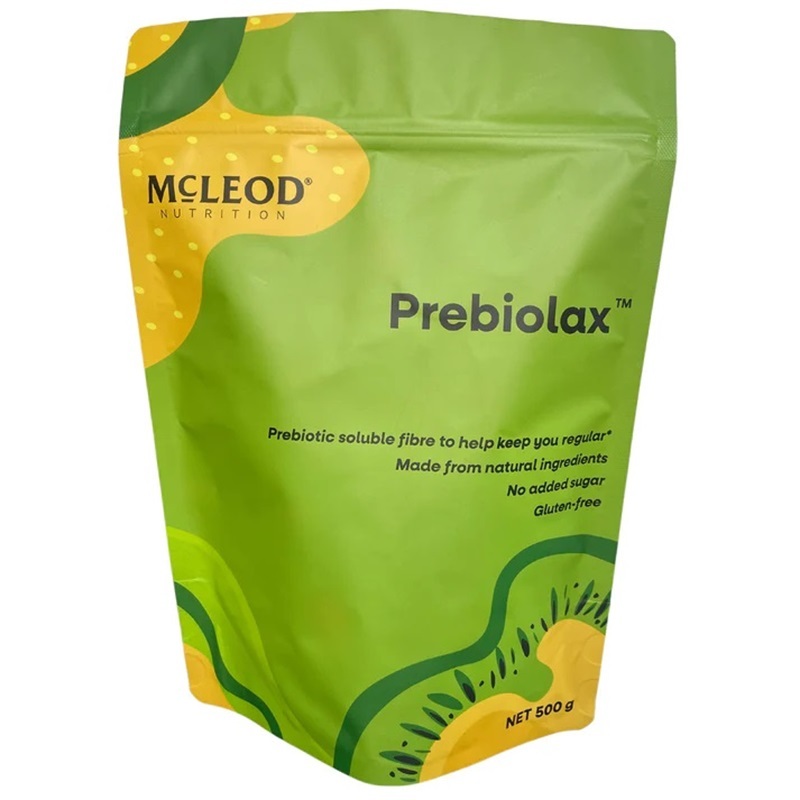Nutrition solutions potentially a recipe for business success
Ashley Smyth
14 February 2024, 1:18 AM
 McLeod Nutrition company director Andrew McLeod and office manager Rangi McLeod are a husband and wife team. Photo: Ashley Smyth
McLeod Nutrition company director Andrew McLeod and office manager Rangi McLeod are a husband and wife team. Photo: Ashley SmythWhen you think of protein powder, your mind may automatically go to lifting weights and building bigger muscles, but Dr Andrew McLeod says a bit of extra protein can be beneficial for everyone. (10-minute read)
Andrew’s new Ōamaru business McLeod Nutrition is the culmination of his extensive background in the pharmaceutical industry and his desire to offer nutritional solutions for the elderly and those with other health problems.
“Throughout my career, I’ve been committed to helping individuals who struggle with medical and nutritional problems. Finding a solution so people can be happy and healthy has always driven me,” he says.
A former Waitaki Boys’ High School student, Andrew left Ōamaru after high school to study pharmacy at Otago University. He then completed a PhD in pharmaceutical chemistry at the University of California San Francisco, in the United States.
“I was one of those kids that used to have a chemistry set that makes up potions, you know - nightmare-ish. I loved it.”
The majority of his career, Andrew played a key role in research and development with Douglas Pharmaceuticals, in West Auckland.
The company is behind the Clinicians and Phloe brands, as well as a large number of prescription medications.
During the Covid-19 lockdowns Aucklanders were hit heavier than most, and Andrew and his wife Rangi bought a holiday home in Ōamaru to escape to. Last year they decided to move back permanently with their family - they have three children, aged 32, 22 and 12.
Selling their house in Auckland freed up some money which allowed Andrew to set up his business here - manufacturing and selling whey protein concentrate and a prebiotic soluble fibre - Prebiolax.
Interestingly, McLeod Nutrition products are targeted at pets, as well as humans.
“Everybody can benefit from good nutrition when they’re ill,” he says.
He describes his business model as slightly different. There is no physical store, although people can purchase his products online at mcleodnutrition.com, and his customer base is across New Zealand.
“We just happen to be based in Oamaru, and that's a little bit unusual for people to get their heads around.
“A lot of businesses here, a lot of them are supplying the rest of the country, they just happen to have their headquarters in Ōamaru, and so we thought, why not?
“Ōamaru really punches above its weight. There’s an industry here that you would never know was doing it, and doing well here, they just quietly achieve, just get on and get the job done.”
McLeod Nutrition customers are people (and pets) who are ill, the people who look after them - “so caregivers or pet owners, so it could be a person working at a rest home or it could be a person at home looking after a loved one who’s ill or old” - and also people who are trying to be proactive and prevent illness.
Whey protein is a fast digesting protein source which contains branched chain amino acids (leucine, isoleucine and valine), as well as cysteine - all of which help to build muscle, skin, hair and nails, and assist with wound healing.
Andrew aims to soon have his products in Chemist Warehouse, and the company has just secured a contract with wholesale food provider Bidfood. He is also a supplier to Metlifecare, so McLeod Nutrition products are now in their care homes across the country.
Andrew has teamed up with well-known cook Allyson Gofton to produce a number of recipes using the flavourless whey protein as an ingredient, and on the website there are recipes for family favourites such as scones, date loaf, and quiche.
“We wanted to make it subtle so that you can add it to food and drink. Because the dietitians are big about food first. They don't want the person to be on milkshakes the rest of their life, they want them to be on soups, or something baked, or you can add it to cereal.

Allyson Gofton's date loaf, made using McLeod Nutrition whey protein concentrate. Photo: Supplied
It is also possible to “fortify” milk with extra protein.
“You could shake up our product with milk, keep that in the fridge, and then as you have your cereal in the morning, or tea and coffee . . . you can add that protein.
“It's not rocket science, but it's about being flexible and working with real food, rather than drop that real food and have a milkshake.”
Andrew works closely with health professionals - dieticians, nutritionists, doctors, nurses, and pharmacists - “because I relate better to health professionals”.
One of the dieticians he works with, Helen Gibbs, now comes to his Eden Street offices once a month for the public to book private consultations.
She specialises in preparing patients for weight loss surgery, which ties in beautifully with what Andrew is trying to achieve with McLeod Nutrition.
“When you have weight loss surgery, you can’t absorb protein too well, or a lot of nutrients very well, as your stomach has changed, so we think that bariatrics is a sort of an illness or a space where we want to help.”
People with diabetes and sarcopenia (an age-related loss of skeletal muscle mass and strength), are also likely to benefit from McLeod Nutrition products, as well as those healing from surgery.
“So they're quite serious illnesses, but they can all benefit from having good nutrition. It's not medicine, but actually nourishing them to help to heal from the inside.
“Yeah, there's an underlying problem. It could be physical, it could be just age, it could be another illness, but we're helping to support them to be stronger, but you're not saying we're going to cure it, we're just supporting them.
“Because sometimes people think, oh, if they put a dressing on it, or they use a cream, it'll heal, but if the person's malnourished, if they're actually missing things inside, they can't heal. They need those building blocks to help heal from the inside out.”

It’s the same for pets, he explains.
“Because a lot of people have got a loved one in their family who happens to be a dog or a cat. Sometimes it's the only family member they've got at home, you know, and they're very dear to them.”
His products can aid animals with arthritis, skin and coat disorders, gut issues, and even anxiety.
“During Covid a lot of us were working from home, our pets had us around a long time and then when we went back to work suddenly, they got anxious because they’re alone.
“Anxiety in pets is a big deal.”
Andrew’s goal is to create products that are “nutritious, delicious and clever”.
“So, all the goodies - the protein, fibre, minerals, vitamins that you need, they should taste yum, because sometimes these things taste disgusting . . . and a dog definitely won't eat something that it doesn't like.”
It is important to him that the products have some innovation, branding and “some uniqueness” to make them stand out.
Andrew is the ideas man for McLeod Nutrition - and is happy to hand the production side over to those who do that best.
“We're not a massive factory or warehouse, we're about idea generation and formulation development, and then about project management. So we work with contract manufacturers.”
Ōamaru company Milligans Food Group is one of those manufacturers, and the other is Hansell’s Masterton. The products are packaged by a contractor in Auckland.
“We don't want to have our own factory at the start, it doesn't make sense. You're better off to go with the experts where they are.”
Once there is a factory, there are staff to worry about, and paying the bills.
“I think as a new business starting up, you don't need all that angst.”
So, the plan now is to grow the business, but not too quickly. He likens the process to building a fire.
“You've got to get it all prepared, you've got to start with the little, little wins to grow it and grow it, and then you get the big factory, that can happen later on, but for now we're still with that early, early adoption.
“So people that buy our stuff are innovative and confident and, you know, willing to give something a bit of a go.
“I'd love to say we're making oodles of money and it's all, you know, wildly successful. We're still at that early stage.
“Once it's on the menu for all the rest homes, then it just chugs along really nicely. You don't have to get that each, individual sale . . . So that's what we're doing right now. And we're just trying to grow it.”
Andrew believes there is room for New Zealand to do a lot more exporting in the specialised nutrition space, and doesn’t know why it’s not happening.
There is a tendency to export, for example, bags of milk powder, rather than something a little bit more specialised.
When he was working with Douglas Pharmaceuticals, he learned there is a need for “nice, small volume, high value, specialised products”.
Exporting is in sight for McLeod Nutrition, but not until the home market is well established, and it has a good reputation.
“I think it's going to start growing quite rapidly now. A good year is about getting your credibility and your products developed and reassuring people, because it's not a low-risk proposition, it's people trusting us.”
Andrew says the point of difference in his product’s success lies with his target market.
“The whey protein you currently buy tends to be for gym junkies and people that are young and feel fit, not so much for the elderly or people that are ill.”
It tends to be intensely flavoured and sweetened, and used predominantly in shakes.
His flavourless and unsweetened whey protein is the only whey being supplied by Bidfood.
“So that's a bit different, having it through food service, so that's, I suppose, the route to market. It's a bit different for us . . . and working closely with the dieticians, because they weren't really involved in it before.
“Working with the health professionals and explaining what it's about and they can see the results themselves with their patients, that's a bit different.
“So it's not so much about the product, but about the support and the approach you're taking that's different.”

His second product Prebiolax is soluble fibre that can be added into almost any liquid (except carbonated drinks) and it doesn’t change the texture, or create “a whole bunch of side effects” such as gas and bloating.
“It’s a nice fibre . . . this one is actually remarkably straightforward. And we've got New Zealand kiwifruit in there as well to make it a little bit unique, and there's enzymes in kiwifruit that help with digestion.”
McLeod Nutrition has other products under development as well.
“But yeah, I think the uniqueness is working with those health professionals to figure out what they need, what their patients need, and then giving them that.
“I'm quite excited about it.”
In his first year of business, Andrew has learned a lot.
He has learned patience, and to let things grow at their own rate, especially being based in Ōamaru, which he describes as “cautious” in comparison to Auckland.
“You can’t force things.
“It's more like, well, we can just wait, or think about that, or hold on to that, or see what other people think about that first. So that was probably the biggest learning.
“It's not Auckland on a small scale, it's a different mentality. But that's also a good thing, because once you're in, there's a loyalty and a good connection.
“It's stable rather than ‘sorry, you're out now’.”
Another big learning was getting the dietitians on board right from the start.
“In my previous role at Douglas Nutrition, we didn't really understand their thinking or their needs too well. Whereas now, I really do.
“And they have a lot of power when it comes to menu development and decision making with their patients, whether they be corporate or individuals. So that was important to do work with them.
“They are also quite cautious and conservative at first. So, you know, we are in a space where there's a high deal of trust and it's important to do it right.”
Moving out of Auckland was another crucial piece of the success puzzle.
“Selling up our house and having a nest egg to start the business and to just ride it out, to build things, that's important.
“Cash flow for a new business is critical, right? That's why we didn't want to load it up with a whole bunch of overheads that we couldn't sustain. We wanted to just be sort of lean and nimble and patient. I don't think we could say that too much.
If they had stayed in Auckland, the business would have been “part-time, on the side, half-hearted”, he says.
“By quitting (his job) and going confidently and just devoting ourselves to it, you know it'll be successful.
“It's not like, oh, we're just gonna bob both ways. This is it. This is what we're doing. This is what we have to do.”
As a small business owner, every sale is celebrated. Working for Douglas, with a staff of 700, all doing something different, Andrew said it was harder to know how his work had an impact.
He likens it to being on a big cruise liner, whereas now he’s rowing a dinghy.
“When you get there, you get so excited because you made it. You've got a sale.”
Family is another reason he and Rangi, who manages the office, are doing this. They want to build something that their children want to be involved in further down the track, and that is sustainable.
“That's one thing too about Ōamaru, is you tend to have legacies being built here . . . That's something to be proud of.”




